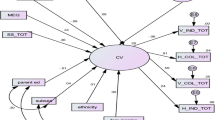Abstract
The relationship between a Midwest church-affiliated institution and its supporting congregations provides an opportunity to investigate part of the sociological environment within which a college-choice decision is made for students of a strong denominational orientation. Applying the “local-cosmopolitan” dichotomy used by previous researchers, this study hypothesized that the cultural orientation of local congregational leaders reflects norms that are aligned to congregational enrollment support or nonsupport for the denominational university. The findings demonstrate that the concepts of cultural, social, and ecclesiological localism-cosmopolitanism are helpful in explaining an individual's support for the denominational university. Also, differing cultural orientations among congregational leaders are related to the degree to which the congregation supports the university with the enrollment of youth.
Similar content being viewed by others
References
Brock, Frank A. (1989). The christian college challenge: Moving beyond the comfort zone.Faculty Dialogue 11(2): 111–122.
Chapman, David W. (1981). A model of college student choice.Journal of Higher Education 52(3): 490–505.
Davis-Van Atta, David L., and Carrier, Sam C. (1986). Using the institutional research office in managing college enrollments. In D. Hossler (ed.),Managing College Enrollments: New Directions for Higher Education, pp. 73–87. San Francisco: Jossey-Bass.
Dobriner, William M. (1958). Local and cosmopolitanism as contemporary suburban character types.The Suburban Community. New York: Putnam Press.
Dye, Thomas R. (1963). The local-cosmopolitan dimension and the study of urban politics.Social Forces 42(2): 239–246.
Gouldner, Alvin W. (1957–1958). Cosmopolitan and locals: Toward an analysis of latent social roles.Administrative Science Quarterly 2(3): 281–306.
Hossler, Donald (1986).Creating Effective Enrollment Management Systems. New York: College Entrance Examination Board.
Hossler, Donald, and Gallagher, Karen (1987). Studying student college choice: A three-phase model and the implications for policy-makers.College and University 64(2): 207–221.
Jackson, Gregory A. (1981).Sociologic, Economic, and Policy Influences on Collegegoing Decisions. Cambridge, MA: Harvard University Press.
Jackson, Gregory A. (1982). Public efficiency and private choice in higher education.Educational Evaluation and Policy Analysis 4(2): 237–247.
Kasarda, John D., and Janowitz, Morris (1974). Community attachment in mass society.American Sociological Review 39(3): 328–334.
Lehman, Edward C., Jr. (1987). Sexism, organizational maintenance, and localism: A research note.Sociological Analysis 48(3): 274–282.
Lehman, Edward C., Jr. (1988, October). Localism and Sexism: A Replication. Paper presented at the meeting of the Society for the Scientific Study of Religion, Chicago, IL.
Lenski, G. E. (1961).The Religious Factor. Garden City: Doubleday.
Leonardo, Pat A., Herald, Janet G., and Anderson, Mark (1986). Make the most of religious preference when recruiting students.The Admission Strategist: Recruiting in the 1980s, vol. 7, pp. 24–35. New York: College Entrance Examination Board.
Linton, Ralph (1945).The Cultural Background of Personality. New York: Appleton-Century-Crofts, Inc.
Litten, Larry H. (1982). Different strokes in the applicant pool.Journal of Higher Education 53(4): 383–402.
Maquire, John, and Lay, Robert (1981). Modeling the college choice process.College and University 57(1): 123–139.
Merton, Robert K. (1957).Social Theory and Social Structure. Glencoe, NY: Free Press.
Roof, Wade C. (1972). The local-cosmopolitan: Social differentiation in mass society.Sociological Analysis 32(1): 1–14.
Roof, Wade C. (1974). Religious orthodoxy and minority prejudice: Causal relationship or reflection of localistic world view.American Journal of Sociology 80(3): 643–644.
Roof, Wade C. (1976). Traditional religion in contemporary society: A theory of local-cosmopolitan plausibility.American Sociological Review 41(3): 195–208.
Roof, Wade C. (1978).Community and Commitment: Religious Plausibility in a Liberal Protestant Church. New York: Elsevier.
Thielbar, Gerald W. (1966).Localism-cosmopolitan: Social Differentiation in Mass Society. Minneapolis. University of Minnesota.
Tierney, Michael L. (1983). Student college choice sets: Toward an empirical characterization.Research in Higher Education 18: 271–284.
Tillery, David (1973).Distribution and Differentiation of Youth: A Study of Transition from School to College. Cambridge, MA: Ballinger Publishing Company.
Tweedell, Cynthia B. (1987, April). Parental Influences on College Choice: The Case of the Conservative Protestant College. Paper presented to the Midwest Sociological Society, Chicago, IL.
White, R. (1967). Toward a theory of religious influence.Pacific Sociological Review 10(1): 23–28.
Wiese, Michael D. (1990). Strategic implications of cultural analysis: Preserving purpose through market research.College and University 65(2): 95–108.
Author information
Authors and Affiliations
Rights and permissions
About this article
Cite this article
Wiese, M.D., Townsend, B.K. College choice in the church-affiliated sector of higher education: The influence of congregational cultural orientation. Res High Educ 32, 107–122 (1991). https://doi.org/10.1007/BF00974432
Received:
Issue Date:
DOI: https://doi.org/10.1007/BF00974432




